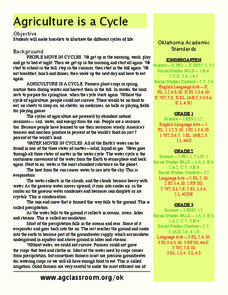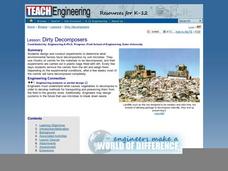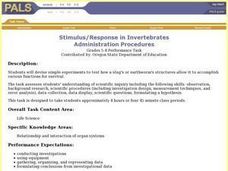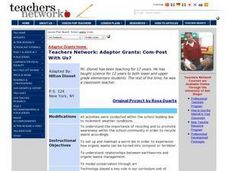University of Minnesota
Sheep Brain Dissection
Bored with frog and earthworm dissections? Had your fill of fetal pigs? Anatomy students will be intrigued by the sheep's brain, and you will be prepared with guiding questions, extension activities, and pictures as they dissect one —...
Curated OER
Preparing for the New Haven Public School Science Fair Through Environmental Science
Students discover what type of effect that pesticides have on earthworms. They use three different types of pesticide and examine the external and internal effects that each have on earthworms. They maintain earthworms in habitats...
Curated OER
Working Worms
Students study earthworms and their role in creating healthy soil for healthy food. In this earthworms and soil lesson plan, students complete an jug experiment to learn about the role of earthworms and healthy soil. Students read and...
Curated OER
Earthworm Movement and Landscape Structure
Students describe differences in animal usage of habitats depending upon successional status of site. They also design other experiments to test movement patterns of animals through habitats of differing structure.
Curated OER
Experiment on Minimal Segment Size Regeneration of Lumbriculus variegatus
The experiment allows students to observe regeneration of tailless and headless worm segments into complete individuals. Data of a completed experiment are included as well as a student activity sheet.
Curated OER
Bug Detective
What happens when a living thing dies? After reading a paragraph of background knowledge on the life cycle of bugs, third and fourth graders work through four clues to figure out which bug is which. When they finish, they can study the...
Curated OER
Composting With Worms
Third graders predict what happen in two (control and experiment) containers -- one with soil and trash, the other with soil, trash, and worms.
NOAA
What's New?
Biodiversity in some areas is more diverse than one might think. Using a two-day lesson, pupils consider the biodiversity of the Hudson Canyon and the characteristics of one organism. They begin with an analysis of the common earthworm...
Curated OER
Animal Behavior
High schoolers investigate stimulus-response behavior, learned behavior in animals and innate behavior in animals. In this animal behavior lesson plan, students answer questions about their reactions to a toy cap gun that is fired off in...
Curated OER
Characteristics of Living Things
Student use the scientific method to experiment with worms. In this characteristics of living things lesson, students predict and examine the reactions of worms to dry and wet soil. Students share their findings.
Curated OER
Agriculture is a Cycle
Students explore cycles in nature. In this cross curriculum agriculture lesson, students define "cycle" and research weather and planting folklore. Students make a bracelet in which individual colored beads represent the many "cycles" of...
National Wildlife Federation
Habitat Web
Young scientists weave together an understanding of ecosystems with this fun collaborative activity. Taking on the roles of different living and non-living elements of specific habitats, learners use a ball of yarn to create the web of...
Nuffield Foundation
Observing Water Moving Through Plants
We know plants assist in the water cycle, but how do plants get water from the ground into the air? Through a series of demonstrations or labs, scholars observe the movement of water through plants. They microscopically view the cells...
Nuffield Foundation
Making Up Nutrient Agars
A resource rich in information—and nutrients. Learners create agars for the purpose of cell cultivation in Petri dishes. The lesson provides instructions on how to create agars for the cultivation of different microorganisms.
Nuffield Foundation
Making Serial Dilutions
There's no need to water down the resource. A tutorial takes learners through the process of creating dilutions for any solution. Specifically, it focuses on serial dilutions with successive factors of 10.
Curated OER
Science: Where the Worms Live
Students build mine-earthworm habitats to discover their niche in them. They make predictions about what the niche looks like in a week and draw a picture of it. Students notice the tunnels in the soil and how the sand and dirt are now...
Curated OER
Big Fat, Juicy Worms
Learners collect and study information about worms. They discover how an earthworm helps process and loosen the soil. They write in their journals as well.
Curated OER
Dirty Decomposers
Seventh graders design and conduct experiments to determine what environmental factors favor decomposition by soil microbes. They use chunks of carrot for the materials to be decomposed, and their experiments are carried out in plastic...
Curated OER
Stimulus/Response in Invertebrates
Students design and conduct and experiment to determine how invertebrates react to an outside stimulus such as light and other stimuli. Student must develop a clear plan of action, collect data in an organized manner and analyze their...
Curated OER
Agriculture is a Cycle
What do a bicycle and the life cycle have in common? Cover this and more with the series of cross-curricular activities included in this plan. Learners do everything from making bracelets that represent the life cycle to checking out the...
Curated OER
Recyclers to the Rescue
Fifth graders examine the concept of the food chain and define producer, consumer, herbivore, carnivore, and omnivore. They draw a food chain for a mouse and discuss the different organisms involved in the chain, and conduct an...
Curated OER
Eco-enrichers
Students discover the importance of plant and animal components within soil. In this soil instructional activity, students test the quality of soil. Students then conduct an experiment adding different components to bags of soil to see...
Curated OER
Com-Post With Us?
Students discuss the importance of reducing, recycling and reusing materials to help the environment. As a class, they create a worm bin and observe how it turns material in to compost. They use the internet to research the...
Nuffield Foundation
Making a Calibration Curve for Starch Concentration
How well can your class concentrate on solutions? Scholars use colorimeter absorption to explore a starch concentration calibration curve. They add iodine to different starch solutions to see how the concentration of the solution changes.

























